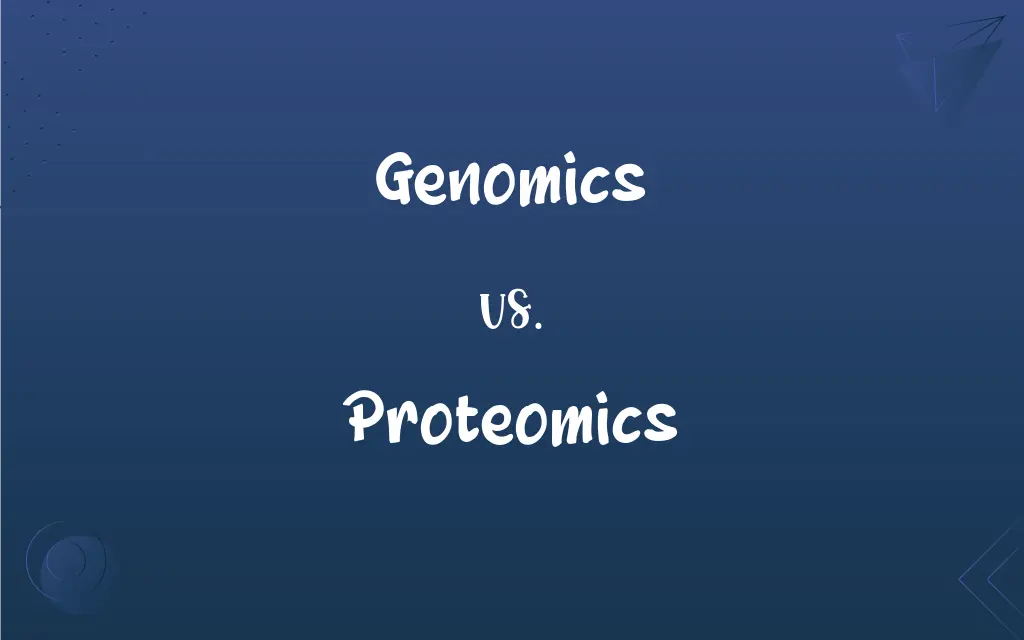Genomics vs. Proteomics: What's the Difference?
Edited by Janet White || By Harlon Moss || Updated on October 26, 2023
Genomics studies the entirety of an organism's genes, while proteomics focuses on its entire set of proteins.

Key Differences
Genomics is the comprehensive study of the complete set of DNA in an organism, encompassing all its genes. This branch of molecular biology aims to decode and map the entire genetic material of an organism. On the other hand, proteomics investigates the entire set of proteins produced by a genome.
While genomics dives deep into the genetic codes, examining sequences, structures, and functions, proteomics delves into the proteome, the total complement of proteins expressed by a genome. Essentially, while genomics deals with the blueprint, proteomics deals with the products made from that blueprint.
Genomics provides insights into evolutionary processes, genetic variations, and disease susceptibility, enabling the development of personalized medicine strategies. Proteomics, conversely, offers a closer look at cellular functions, as proteins are the primary agents of biological function, mediating most life processes.
Although both genomics and proteomics provide critical insights into biological systems, they have distinct methodologies. Genomic techniques often involve sequencing and analyzing DNA, whereas proteomic techniques involve protein separation, identification, and quantification.
It's crucial to understand that genes (the focus of genomics) give instructions for making proteins (the focus of proteomics). Thus, while genomics offers a theoretical framework of potential functions, proteomics delivers a more practical snapshot of what's happening inside cells at any given moment.
ADVERTISEMENT
Comparison Chart
Focus
Entire set of genes
Entire set of proteins
Main Subject
DNA sequences
Proteins
Provides Insights Into
Genetic variations, disease susceptibility
Cellular functions, protein interactions
Methodologies
DNA sequencing, analysis
Protein separation, identification, quantification
Implications in Medicine
Personalized medicine, gene therapy
Drug target identification, disease markers
ADVERTISEMENT
Genomics and Proteomics Definitions
Genomics
Analysis of DNA sequences in organisms.
Genomics techniques were employed to identify the mutation responsible for the disorder.
Proteomics
The study of the entire set of proteins in organisms.
Proteomics helps in understanding how cells respond to different stimuli.
Genomics
The study of genomes.
Genomics has revolutionized our understanding of hereditary diseases.
Proteomics
Comprehensive profiling of proteins in specific cells or tissues.
Cancer proteomics focuses on identifying protein markers for early detection.
Genomics
Decoding the entire genetic material of an organism.
Advances in genomics have paved the way for precision medicine.
Proteomics
Investigation of protein expression and modifications.
Proteomics techniques revealed that the protein was heavily phosphorylated.
Genomics
Exploration of genetic variation and its effects.
Population genomics investigates the genetic diversity within species.
Proteomics
Analysis of protein interactions and functions.
Using proteomics, researchers mapped out the protein's interaction network.
Genomics
Examination of the relationships between genes.
Through genomics, scientists discovered that certain genes work in tandem.
Proteomics
Elucidation of the dynamic changes in protein populations.
Temporal proteomics captures protein changes across different developmental stages.
Genomics
The study of all of the nucleotide sequences, including structural genes, regulatory sequences, and noncoding DNA segments, in the chromosomes of an organism.
Proteomics
(used with a sing. verb) The analysis of the expression, localizations, functions, and interactions of the proteins expressed by the genetic material of an organism.
Genomics
(genetics) The study of the complete genome of an organism
Proteomics
(biochemistry) The branch of molecular biology that studies the set of proteins expressed by the genome of an organism.
Genomics
The branch of genetics that studies organisms in terms of their genomes (their full DNA sequences)
Proteomics
The branch of genetics that studies the full set of proteins encoded by a genome
FAQs
Why is genomics important in medicine?
Genomics can guide personalized medicine and predict disease susceptibility.
Can proteomics identify disease markers?
Yes, proteomics can identify protein markers indicative of diseases.
What does genomics focus on?
Genomics studies the entire set of genes in an organism.
Is genomics limited to human studies?
No, genomics can study the genomes of any organism.
How is proteomics different from genomics?
Proteomics examines the entire set of proteins, while genomics studies the entire set of genes.
Which one provides a more functional perspective?
Proteomics, as it studies proteins which carry out most biological functions.
How do genomics and proteomics complement each other?
Genomics provides the blueprint (genes), and proteomics shows the end products (proteins).
How has proteomics advanced disease diagnostics?
Proteomics can identify disease-specific protein markers, aiding early detection.
How has genomics advanced over the years?
Technological advancements have made genome sequencing faster and more affordable.
Are proteins directly studied in genomics?
No, genomics focuses on genes. Proteins are the primary subject of proteomics.
What techniques are unique to proteomics?
Techniques like mass spectrometry and two-dimensional gel electrophoresis are pivotal in proteomics.
How do genes relate to proteins?
Genes provide instructions for making proteins.
Can genomics predict genetic diseases?
Yes, genomics can identify genetic variants linked to specific diseases.
Can proteomics help in drug discovery?
Yes, proteomics can identify potential drug targets by profiling protein interactions and functions.
How do researchers isolate proteins for proteomics?
Techniques like chromatography and electrophoresis help isolate proteins.
Are there any ethical concerns with genomics?
Yes, concerns include data privacy and potential misuse of genetic information.
How are genomics and proteomics interrelated?
Genomics offers insights into potential protein function, while proteomics reveals actual protein activity.
Are all genes studied in genomics expressed as proteins?
No, not all genes are translated into proteins.
Does genomics consider gene interactions?
Yes, genomics can analyze interactions and relationships between genes.
Can proteomics provide insights into cellular pathways?
Yes, proteomics can map protein networks, revealing pathway dynamics.
About Author
Written by
Harlon MossHarlon is a seasoned quality moderator and accomplished content writer for Difference Wiki. An alumnus of the prestigious University of California, he earned his degree in Computer Science. Leveraging his academic background, Harlon brings a meticulous and informed perspective to his work, ensuring content accuracy and excellence.
Edited by
Janet WhiteJanet White has been an esteemed writer and blogger for Difference Wiki. Holding a Master's degree in Science and Medical Journalism from the prestigious Boston University, she has consistently demonstrated her expertise and passion for her field. When she's not immersed in her work, Janet relishes her time exercising, delving into a good book, and cherishing moments with friends and family.































































